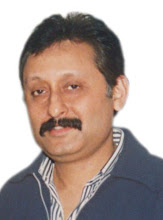Steve
Waugh was different; cool of mind and stout of spirit, he was a fighter to the
core. He left arguably the biggest impact on the game in Australia since
Bradman. His predecessor Allan Border was also a gritty batsman, and became the
highest run-getter in Test cricket. But Border would grind the opposition,
rather than dominate them, and the one feature that characterised his batting
was his propensity to sweep. When the chips were down Border would be an
immovable object for the opposition, but there was nothing endearing about him.
That
was not the case with Steve Waugh. He was forever proving his critics wrong
through sheer strength of character. His twin Mark was far more talented with
the bat as well as a fielder, and more elegant by miles. But it was Steve who
first broke into the Australian team and stayed in longer. He played a key role
in Australia’s
first World Cup triumph in 1987 as a bowler sans nerves, and a lower
middle-order batsman with an abundance of commonsense. His stock as a batsman
continued to rise, and he became a reliable rungetter by the late eighties.
It
was under Border’s captaincy, and with the guiding hand of Bobby Simpson, that
Australia won the 1987 World Cup, but try as he might he could not turn Australia
into the best in the world in either form of the game. That changed when the
more genial and composed Mark Taylor took over. Steve Waugh, helped by twin
Mark, stood up to the West Indies pacemen in a titanic battle at Kingston in
1994-95, which was crucial for wresting the Test series 2-1, amazingly for the
first time against these rivals in nine attempts since the heady days of
1975-76. In that Test Steve Waugh scored 200 and Mark Waugh 126.
Then
Australia
were runners-up in the 1996 World Cup, with Mark Waugh in delightful form, but
Steve not too far behind with bat and ball. Steve Waugh first took over the
One-day captaincy, and then the top job in Tests as well. The start belied what
lay ahead as Brian Lara’s genius denied Australia
a Test series win in the Caribbean in 1998-99,
and then Steve Waugh’s team faltered in the early stages of the 1999 World Cup.
But Australia were unstoppable once Waugh’s fighting hundred, aided by a gaffe
in the field by Herschelle Gibbs, in their last super-six match, and subsequent
tie in the semi-final, also against South Africa, breathed life into the
team.
They
went on to lift the 1999 World Cup, and then carve an unprecedented 16
consecutive Test victories. Steve Waugh built one of the greatest teams in history,
and his own batting continued to rise to greater heights. He scored an
exhilarating century at Sydney
in the 2002-03 Ashes series as a scathing riposte to his critics who wanted him
out of the side. When he took his final bow a year later, he was given a
touching farewell.
By
then he was the most capped player ever at 168 Tests, Australia’s
second-highest rungetter with 10,927 runs at an average of 51.06, and their top
century maker with 32, surpassing Bradman’s tally. Steve Waugh never gave in, or
gave up, the quintessential warrior always searching for new frontiers. He was
strong on the back foot through the off-side, and played the slog sweep better
than most. More admired than loved, he had no shot that would delight the
connoisseur, but he was effective. He never learnt to deal with the rising
delivery, but coped well enough. If ever there was a player with little natural
ability, but achieved super success by dint of hard work, resilience and
determination, it would have to be Steve Waugh.
(Author Indra Vikram Singh can be contacted
on email singh_iv@hotmail.com).
Don’s Century
Published in India by Sporting Links
ISBN
978-81-901668-5-0
Fully
illustrated
Paperback
French Fold 11 x 8.5 x 0.4 inches
Weight
480 grams
188
pages
Available
on Amazon at an attractive price:
https://www.amazon.in/dp/8190166859
Indra
Vikram Singh's other books available on Amazon:
https://www.amazon.in/s?k=Indra+Vikram+Singh&i=stripbooks&rh=p_6%3AA3HSV0N9AV7NOK&dc&qid=1602408830&rnid=1318474031&ref=sr_nr_p_6_1


